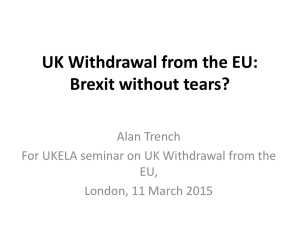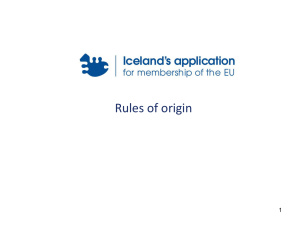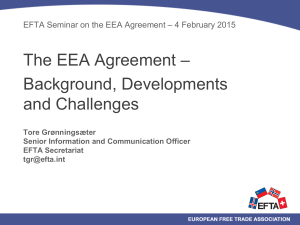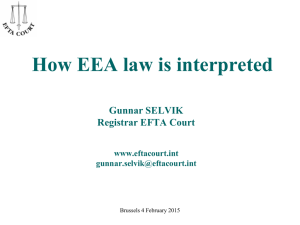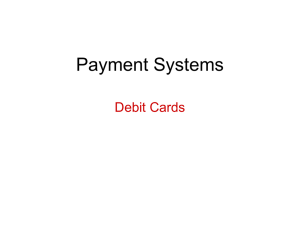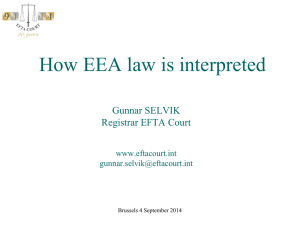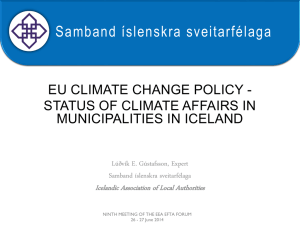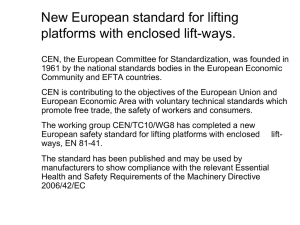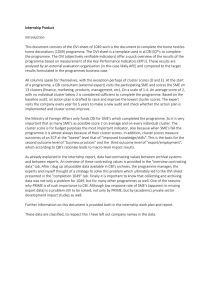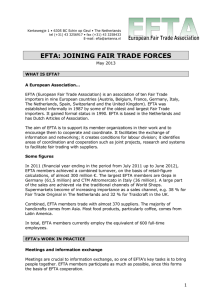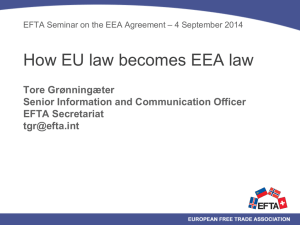International Free Trade Agreements
advertisement
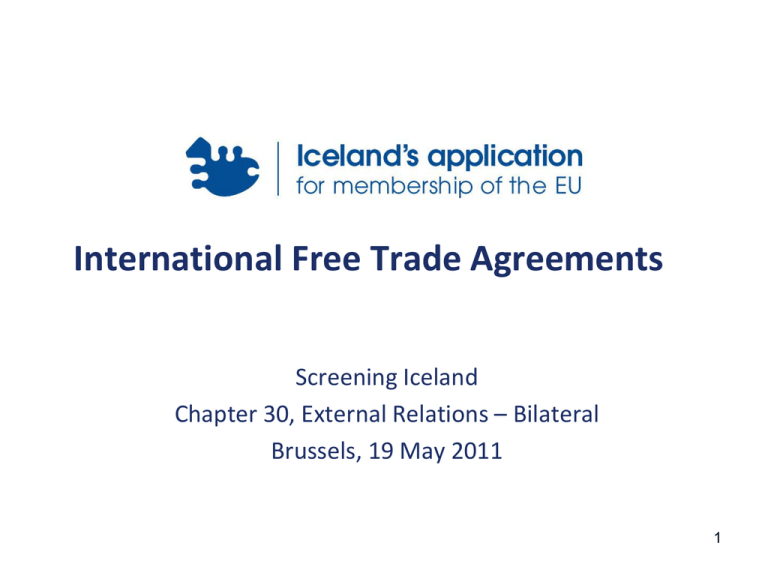
International Free Trade Agreements Screening Iceland Chapter 30, External Relations – Bilateral Brussels, 19 May 2011 1 Introduction • • • • • • European Free Trade Association – EFTA European Economic Area – EEA EFTAs Free Trade Agreements Bilateral Free Trade Agreements Termination of Agreements Issues that require specific attention in the negotiations 2 EFTA – Vaduz Convention • Member of EFTA since 1970 • The scope of the EFTA Convention was expanded in 2002; – trade in services and investment; – mutual recognition of conformity assessments; – free movement of persons, social security and mutual recognition of diplomas; – land and air transport; – public procurement; – intellectual property rights. • The Convention is updated by the EFTA Council on a continuous basis 3 European Economic Area – EEA • Free movement of goods, services, capital and persons among Iceland, Liechtenstein, Norway and the EU members • Does not entail a common external tariff • Iceland and the other EEA/EFTA states transpose into domestic law, on a continuous basis EU legislation covered by the Agreement 4 EFTAs Free Trade Agreements • One of the world’s largest networks of preferential trade relations • Preferential access to markets of 670 million consumers 5 EFTA - Current Free Trade Agreements • 22 FTAs covering 31 countries – Turkey, Israel, Morocco, Palestinian Authority, Macedonia, Mexico, Jordan, Croatia, Singapore, Chile, Lebanon, Tunisia, Republic of Korea, the Southern African Customs Union (SACU), Egypt, Canada • Colombia, the Gulf Cooperation Council (GCC), Albania, Serbia, Ukraine and Peru • Joint Declarations on Cooperation – Malaysia, Mauritius, Mercosur, Mongolia, Montenegro, Panama 6 EFTA – Negotiations in Progress • • • • • • Bosnia-Herzegovina Montenegro Hong Kong, China India Indonesia Russia, Belarus and Kazakhstan --• Algeria • Thailand 7 EFTA – Dialogues on Closer Trade Relations • Central American States • Malaysia • Vietnam 8 What is in an EFTA Free Trade Agreement? • First generation EFTA Free Trade Agreements (FTAs) establish a free trade area between the partner countries by: – providing for free trade in industrial goods, including fish and other marine products; – liberalising trade in processed agricultural products; – including trade disciplines; and – establishing rules on customs and origin matters. – Trade in basic agricultural products is covered by bilateral agreements between the individual EFTA States and the partner country, which form part of the instruments establishing the free trade area. 9 What is in an EFTA Free Trade Agreement? (2) • Second generation elements: – – – – Intellectual Property Rights Services Investment Government Procurement 10 Bilateral Trade Agreements • Trade Agreement with the EU (1972) – Trade in industrial products, fish products, and processed agricultural products • Agricultural Agreement with the EU (2007) • Faroe Islands – the most extensive FTA • Greenland • Ongoing negotiations – China 11 Termination of Preferential Trade Agreements (1) • EFTA Convention/EEA – Withdrawal by a written notification to the Depositary/other parties twelve months prior to withdrawal taking effect • EFTAs Free Trade Agreements – Withdrawal by a written notification to the Depositary. Takes effect on the first day of the sixth month after the date on which it was received by the Depositary • Bilateral Agricultaral Agreements expire 12 Termination of Preferential Trade Agreements (2) • Trade Agreement with the EU – Withdrawal by means of written notification, which shall take effect twelve months thereafter • Agricultural Agreement with the EU – No provisions • Faroe Islands – Withdrawal by means of a written notification to the other Party, which shall take effect on the first day of the next month after the end of a twelve months period from the receipt of the notification – The benefits that the Agreement provides for investors and service providers, shall remain in place for a period of at least five years after the termination of the Agreement • Greenland – Withdrawal by means of a notification to the other Party, which shall take effect twelve months after the date of the notification 13 Issues that Require Specific Attention in the Negotiations • Securing market access of Icelandic export goods and services in existing free trade agreements of the EU and in FTAs that are being negotiated by the EU – Market access to be comparable to current preferential trade arrangements of Iceland • Securing Iceland's import interests, such as regarding raw material for industry and fish and related products for procesessing of fish and other marine products – Securing Iceland's interests in the import of services. • Secure trade relations with the Faroe Islands, bearing in mind the current comprehensive Free Trade Agreement between Iceland and the Faroe Islands 14 Ministry for Foreign Affairs http://www.mfa.is EU Application Website http://europe.mfa.is/ 15
